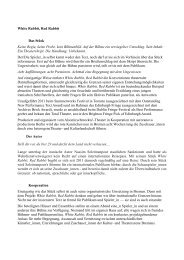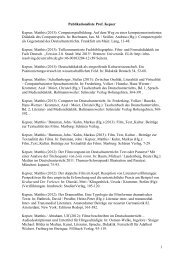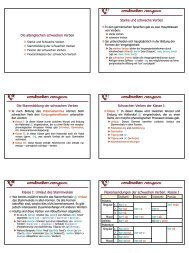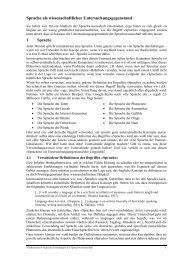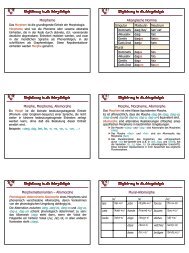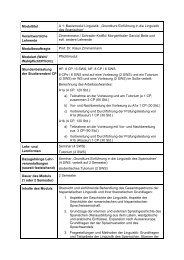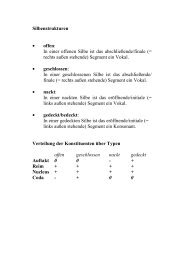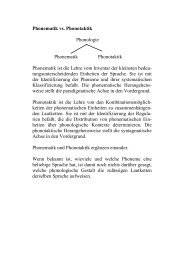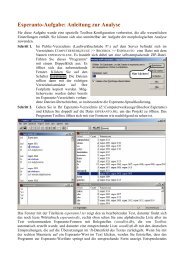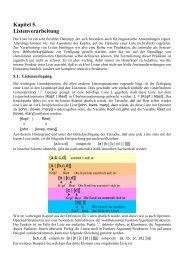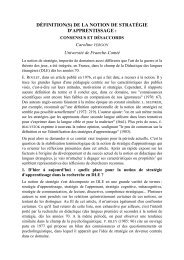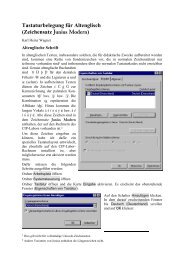Relativism and Universalism in Linguistics - Fachbereich 10 ...
Relativism and Universalism in Linguistics - Fachbereich 10 ...
Relativism and Universalism in Linguistics - Fachbereich 10 ...
Create successful ePaper yourself
Turn your PDF publications into a flip-book with our unique Google optimized e-Paper software.
148 Workshops<br />
12:15–13:00 Nomsa Satyo (Stellenbosch University, South Africa)<br />
Politeness <strong>and</strong> requests <strong>in</strong> Xhosa drama<br />
Lunch break<br />
14:00–14:30 Workshop particpants<br />
General discussion of workshop, results, announcements, goodbye, etc.<br />
Face-sav<strong>in</strong>g as a relative phenomenon <strong>in</strong> parliamentary context:<br />
a study of the Nigerian national assembly<br />
Akpan, Ekaete Evangel / Ekpenyong, Bassey<br />
University of Port-Harcourt, Nigeria / University Of Abuja, Nigeria<br />
angelvangel2001@yahoo.com;drbaekpenyong@yahoo.com<br />
Nigeria is one of the post-colonial countries <strong>in</strong> the world that is struggl<strong>in</strong>g to f<strong>in</strong>d political<br />
stability <strong>in</strong> a democratic culture. Amidst the palpable <strong>in</strong>fluence of the protracted military rule,<br />
the Nigerian Parliament is <strong>in</strong> constant conflict with decisions seen to be meted out by the<br />
Executive Arm of Government, <strong>in</strong> the English language, the country’s official language.<br />
While the Executive Arm is controlled by the rul<strong>in</strong>g Peoples Democratic Party, the parliament<br />
comprises representatives from at least three political parties across the country.<br />
The parliamentarians belong to diverse l<strong>in</strong>guistic backgrounds with different cultural <strong>in</strong>dexes<br />
<strong>in</strong> h<strong>and</strong>l<strong>in</strong>g situational faces. In the daily parliamentary deliberations, issues of national<br />
<strong>in</strong>tegration, distribution of economic amenities <strong>and</strong> political positions, <strong>in</strong>dividual <strong>and</strong><br />
community empowerment are negotiated <strong>in</strong> sometimes very volatile atmosphere exud<strong>in</strong>g<br />
immense pragmatic <strong>in</strong>terest.<br />
In these contexts, there are possibilities of exposure to personal <strong>in</strong>sult, derogatory remarks,<br />
disregard for one’s status, failure to achieve desired goals <strong>and</strong> damage to valued friendly <strong>and</strong><br />
political relationships.<br />
It was observed that at the end of face-threaten<strong>in</strong>g behaviours, face-sav<strong>in</strong>g or face-honour<strong>in</strong>g<br />
processes also occur with due reference to <strong>and</strong> application of the parliament Rules Book<br />
coded <strong>in</strong> English, structured after universal pattern but with matters relative to the Nigerian<br />
Parliament. Can this reference to universal parliamentary Ethics, coded <strong>in</strong> English but applied<br />
by Nigerians from a mix of <strong>in</strong>digenous languages <strong>and</strong> l<strong>in</strong>guistic identities said to be really<br />
universal? This paper seeks to answer this question <strong>in</strong> the context of postulations by Brown<br />
<strong>and</strong> Lev<strong>in</strong>son (1978) Rosenberg (2004).<br />
Name-escapism as face-sav<strong>in</strong>g strategy <strong>in</strong> Cameroonian cultures<br />
Anchimbe, Eric A.<br />
University of Munich<br />
anchimbe_eric@yahoo.com<br />
“And you dare call me by my name? – the world these days is amiss.” This is a common<br />
phrase <strong>in</strong> most African contexts where the (unwritten) code of name-escapism as a sign of<br />
respect for the other is used. To call someone by name is not only disrespect but also a sign<br />
that he or she has no honour to merit that respect that goes with ‘not call<strong>in</strong>g his or her name.’<br />
This paper discusses the different contexts of name-escapism <strong>and</strong> the socio-pragmatic impacts<br />
each creates. It studies among other th<strong>in</strong>gs, name-escapism between the young <strong>and</strong> old;



